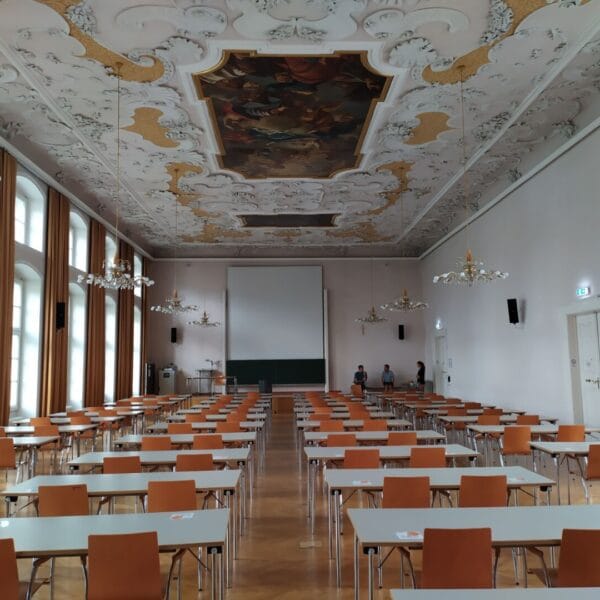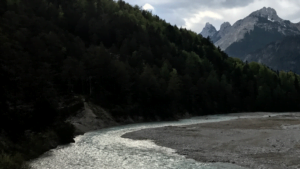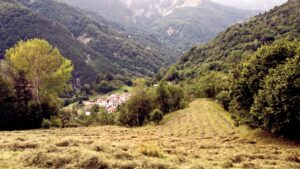ID71: The role of commons in mountain regions under global changes
Details
Full Title
Quo vadis, dear commons? – The role of commons in mountain regions under global changes
Scheduled
Wednesday, 2022-09-14
16:00 - 17:30Convener
Co-Conveners
Emmanuel Salim, Claire Peres, Raphaël Lachello, Aurélie Debusschère, Emmanuel Salim and Yannick Vialette
Assigned to Synthesis Workshop
4. Social innovation and community resource management
Keywords
Commons, resource management, landscape, collective action, climate change, governance, social innovation
Description
In mountain regions, the organisation of different types of commons contributes to socioeconomic livelihoods, landscape maintenance and the social tissue of local populations. However, it is not clear how commons are evolving in view of rapidly moving circumstances such as climate change, the exploitation of resources or evolving life style expectations. We embed the various (e.g. spatial, temporal and organisational) dimensions of commons in the social-ecological context of mountain regions. We aim to assess their past and future trajectories and to identify and systemize their possible links, roles and responses to global changes. The session systemizes the commons field and promotes interdisciplinary collaborations between researchers. Leading questions: What defines commons in mountain regions? What are their specifics? Can commons act as a suitable boundary subject for interdisciplinary research in mountain regions? How can mountain commons facilitate transformative change for local and global societies? Which regulative mechanisms affect commons in mountain regions?
Important: This session is closely related to session ID13 and therefore it’s planned that the sessions will be scheduled consecutively.
Registered Abstracts
Abstract ID 683 | Date: 2022-09-14 16:00 – 16:11 | Type: Oral Presentation | Place: THEOLOGIE – Madonnensaal |
Lachello, Raphaël (1,2,3,4)
1: Université Grenoble Alpes (UGA)
2: Laboratoire de Recherche Historique Rhône-Alpes (LARHRA)
3: Collectif Perce-Neige
4: Labex ITTEM
Keywords: Forest Commons. Alpine Forests. Forest History. Social-Ecological Systems.
Mountain territories have already experienced the consequences of global changes in the past: modification of the energy regime, political and demographic upheaval, new planning practices, etc. A large part of French alpine forests are municipal properties, managed as a collective resources, which have had to adapt to these changes with varying sucess rates but from which it is possible to broaden our understanding. This presentation therefore proposes to study the diversity of adaptation modes of french collective forests during the 19th and 20th centuries through the case study of the Maurienne valley in Savoie.
19th century Maurienne valley forests were shaped by domestic needs and metallurgic industry. Both demography and industrial activities reached a top from mid-19th century on. Some populous communities, guaranteed sustainability of their collective forests by focusing on internal domestic needs. While others benefited from this strong demand to finance their economy by selling wood outside the community. The change of forestry regime caused by the annexation of Savoie in 1860 by France, the sudden collapse of the wood consuming industrial activity after the mid-19th century and the progressive modification of the heating methods, led to major adaptations of the collective forest management. The aim of this presentation will be to study the nature, diversity and social-ecological outcomes of such adaptations. To do so we incorporate data extracted from French Forest Administration and Municipal archives into a Geographical Information System that allow to understand which factors influence common spaces organization. In order to reconstruct collective forest management adaptations with exhaustiveness, our study resolution is set at the parcel scale in a sample of 9 municipalities from the Maurienne valley (Savoie).
Abstract ID 220 | Date: 2022-09-14 16:11 – 16:22 | Type: Oral Presentation | Place: THEOLOGIE – Madonnensaal |
Stevens, Madison Paige
University of British Columbia, Canada
Keywords: Community Forests, Mental Models, Global Change, Local Resource Management, Commons
In Johar Valley, Uttarakhand, India, van panchayat community forests provide vital support for the wellbeing of mountain communities –– both human and ecological. Tasked with safeguarding these values, community forest managers exercise decision-making authority in each village forest parcel, informed by individual and collective understandings of what it means to care for their particular forest commons. While mountains environments sustain the people who live in and near them, the same characteristics which support diversity are also rendering mountain communities acutely vulnerable to changing environments, demographics, and governance regimes. We drew on open-ended interviews with 41 forest managers in Johar Valley (conducted in November, 2019 to January, 2020) to identify key changes and articulate where different forest managers stood on each issue. We then coded interview data into sets of mental models to offer insights into the determinants of forest managers’ conflicting perceptions of these changes and their implications for management choices. We demonstrate that van panchayat managers are currently navigating stewardship pathways in response to three significant and entangled dimensions of upheaval: 1) Changes in environmental condition associated with global processes as they intersect with local influences on vulnerable mountain ecosystems; 2) Population shifts and changes to historical livelihoods, which influence the level of forest dependence among local residents; and lastly, 3) A shift in co-management regimes in van panchayats, affected by both regulatory changes and the capacity of local institutions. Among local forest managers, perceptions of the drivers, trends, significance, and appropriate responses to these changes diverge sharply. As communities endeavor to sustain the region’s van panchayats into the future, this analysis shows that a shared understanding of change remains elusive. However, we argue that forest managers’ efforts to build alliances across the region indicate a willingness to approach emerging challenges cooperatively, and despite barriers, find common ground among diverse perceptions, priorities and practices of care.
Abstract ID 915 | Date: 2022-09-14 16:22 – 16:33 | Type: Oral Presentation | Place: THEOLOGIE – Madonnensaal |
Martín Civantos, José María; Correa Jiménez, Elena; Román Punzón, Julio Miguel; Bonet García, Teresa; Abellán Santisteban, José; Modrego Fernández, Roque; Ramos Rodríguez, Blas; Peralta Martínez, Rubén; Couto González, Sergio
MEMOLab – Laboratory of Biocultural Archaeology – University of Granada, Spain
Keywords: Governance, Values, Traditional Irrigation Systems, Water, Mediterranean
The Traditional and Historical Irrigation Systems (T&HIS) are communal systems, strongly linked to the evolution of the Mediterranean mountains landscapes, its biodiversity, and human wellbeing in the region, documented as far back as the 9th century.
The MEMOLab, has been researching and empowering T&HIS in the Sierra Nevada range (Southern Spain) for more than 10 years. Based on bottom-up collaboration with the local irrigation communities governing these communal systems, scientific evidence (e. g. ecohydrological) and traditional ecological knowledge (TEK) has been documented and compiled, helping to better understand the services and values these systems provide.
Besides the most obvious services provided -including regulation of hydrological cycles, recharging aquifers and springs helping to guarantee the supply of drinking and irrigation water-, T&HIS allows a high level of agricultural (crops, pastures, etc.) and biological diversity.
T&HIS are powerful tools to climate change mitigation and adaptation, as well as to prevent and minimize natural disasters. Evidence shows that T&HIS prevents fires by minimizing periods of drought and reducing temperature and increasing humidity. They also reduce erosion and the risk of landslides by improving vegetation cover, regulating surface runoff, and regulating the torrential nature of rivers and floods. Their operation and maintenance have a minimal carbon footprint, and their soils and associated vegetation fix large amounts of carbon, making them major climate change adaptation and mitigation tools.
From the social point of view, T&HIS governance system has proved to be a key tool for social cohesion thanks to its conflict resolution systems. It also improves social justice through a consensual and equitable distribution of water, contributing to a more participatory society and democratizing decisions on essential resources. T&HIS contribute to local circular economy (e. g. use local natural materials and produce no waste) with low dependence on technology, fuels, and other external inputs, making these systems particularly sustainable and resilient. T&HIS contribute to the food sovereignty of mountainous areas by increasing the productivity of crops, pastures, and other ecosystems, while increasing family income, contributing to mitigate rural depopulation, a huge problem in rural Europe, especially in mountainous areas.
The knowledge and preservation of this historical and cultural heritage as something living and active is a tool that helps to mitigate problems and develop and transfer solutions in the social, economic, and environmental fields.
This work is part of Smart EcoMountains, the Thematic Center on Mountain Ecosystems of LifeWatch-ERIC.
Abstract ID 267 | Date: 2022-09-14 16:33 – 16:44 | Type: Oral Presentation | Place: THEOLOGIE – Madonnensaal |
Dalla Torre, Cristina (1,6); Stemberger, Sara (2); Bottura, Juri (3); Corrent, Manola (3); Fusari, Davide (4); Zanoni, Stefano (5); Gatto, Paola (6)
1: Eurac Research, Italy
2: Adamello Brenta Geopark
3: Dolomit Learning
4: Municipality of Comano Terme
5: Nature Reserve Sarca
6: University of Padova
Keywords: Commons, Innovation, Social-Ecological Systems, Knowledge Co-Creation, Global Trends
In mountain and alpine areas, resources have been governed through community-based institutions in a collective and subsidiarity manner, who ensured stewardship and local decision-making over the resources. Community-based institutions for resource governance are referred to as commons in the literature. Such institutions base on cooperative mechanisms that reallocate gains from resource extraction and reinvest them to restore and strengthen local commons and increase resilience to external factors. Because of their relevance, there is the need to understand local impacts of global changes on commons and co-produce community-based solutions to face challenges and go in the wished direction, fitting local specificities and global challenges, such as biodiversity and climate crisis as well as increasing social and economic disparities. The study aims at exploring which reconfigurations enable community-based resource management to foster sustainable development. The study focuses on a a pilot project in two mountain communities in Northern of Italy about setting up community entrepreneurship relating to community-based tourism for the revitalization of collective resources for the thriving of the community in a sustainable, just and ecological manner. Studies on the role of knowledge co-production in the process of innovation of community-based resource management in response to ongoing changes in mountain social ecological systems are missing. The questions we aim to respond to are: what is the outcome of knowledge co-production in terms of reconfigurations in community-based resource management? What are the perceptions of community members and external local stakeholders on how collective resources can be revitalized and managed as drivers of community sustainable development? We adopted a transdisciplinary approach and a research action methodology to co-design intervention and research aims and tools. We applied the social-ecological system framework coupled with social innovation scholarship. Data from co-designed focus groups, survey, participatory activities, interviews and participant observation have been collected and analysed using a qualitative content analysis method. Results and interpretations are presented on: transformations in perceptions of the resource, in actors and stakeholders’ constellations, in deliberation processes, as well as a discussion on the role of knowledge co-development in the study. The study results have been submitted for publication to Mountain Research and Development Journal.
Abstract ID 798 | Date: 2022-09-14 16:44 – 16:55 | Type: Oral Presentation | Place: THEOLOGIE – Madonnensaal |
Debusschère, Aurélie
Collectif Perce-Neige, France
Keywords: Indigenous Knowledge, Sensitive Geography, Mapping
Recently recognized by the United Nations and supported by scientific data, indigenous peoples have proven to be original Earth Guardians (FAO report Forest governance by indigenous and tribal peoples, 2021). Although representing 5% of humanity, traditional societies are managing 11% of worldwide forests, their ancestral territories hosting 80% of the planet’s biodiversity. Millenarian knowledge and consciousness of complex natural mechanisms has led to harmonious, sustainable and regenerative land management until the industrial era. Now facing climate imbalance and biodiversity collapse, western science is opening to new perspectives from the dialogue with indigenous knowledge keepers, to start a new relationship with the commons at a global level.
In 2018, French geographer Eric Julien organized an experimental “territorial health study” called Cross Diagnosis, designed as a transdisciplinary scientific dialogue between two ontologies. 3 medicine men and women of the Kogi indigenous culture (Sierra Nevada, Colombia) shared perspectives with 25 western scientists of complementary expertises to analyze the health of our european commons in the Vercors region (Haut-Diois). Ran during 5 days in the mountain areas, the experimentation led to sensitive map sketching, according to the Kogi perceptions of subtle living interactions, offering an unseen perspective of the landscape’s natural mechanisms, intertwined with human and other species’ activities.
Based on this first experiment, my paper aims to give a specific and original overview of the Kogi people’s subtle geographical perceptions and explain the potentials of imaginating a “third ontology”, where the Kogi knowledge meets the western land management, addressing inspiring strategies to relieve the complex socio-ecosystem mechanisms of Alpine areas.
To achieve that goal, I will showcase visuals of the Kogi’s “territorial body” perspective of landscapes in Vercors, drawing the invisible interconnections between living entities (mountains, rivers, trees…) at a landscape scale and a planetary scale. Indeed, the Kogi believe there is a relationship between all mountains of the world, logically putting the Mont-Blanc and the Alpine Bow in direct connection with their own mountain region, the Sierra Nevada de Santa Marta in Colombia. Through another experimental workshop led in Chamonix area (France) in June 2021, I will then give a special focus on the adaptation and possible integration of the Kogi’s subtle knowledge in concrete local strategies, as a proposal to improve our relationship with the natural world, our “local and global commons”, and start integrating forgotten ancestral knowledge in our transition processes.
Abstract ID 864 | Date: 2022-09-14 16:55 – 17:06 | Type: Oral Presentation | Place: THEOLOGIE – Madonnensaal |
Lopes, Myriam Bahia
UFMG/ Federal University of Minas Gerais, Brazil
Keywords: Keywords
This contribution aims to study the Iron Quadrangle (IQ), one of the world’s most important mineral provinces located in the state of Minas Gerais, Brazil. Three hundred years of mineral exploitation and population densification in IQ have yet left unexplored highland areas with one of the most beautiful Brazilian landscapes. They are now the target of future mega-mine plants.
The decisions made by the government and transnational companies that lead to ore exploitation into the highlands are based on the calculus of the fluctuations of the stock exchange and the possibility of transporting the ores across the planet. The scale and pace of ore production lead to disasters (P. Virilio) such as those that occurred in Bento Rodrigues (2015) and Brumadinho (2019).
The survival of life in the highlands and the security of the population of QF depends on a revision of the history of the highlands. We have to rethink its temporal and spatial frameworks; criticize the notion of mining vocation and locational fixity: where there is ore it has to be mined. And tell which elements are taken into account for the choices that have been done. The historical study may be a basis for local territorial policy. Against the scenario of destruction, we question how to articulate the defense of the highlands, taken as a common, to the movements of integrated global capitalism.



